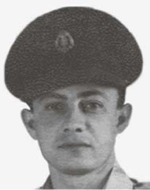Jaeger, Alexander (Sender)
Son of Regina and Menachem Mendel. Alexander was born in Kosowska-Pollyna, Czech Republic, in the Carpathian region, on the 31st of Cheshvan 5744 (31.10.1923). He was educated in his native village, and after completing his mandatory studies he applied for tailoring. In April 1944, during World War II, Alexander and his family were taken together with all the Jews of the area to labor camps, and from there to Auschwitz and Birkenau death camps. Alexander’s family, his parents and their nine children survived, his brother Shmuel and his two sisters, Batsheva and Shoshana. After the liberation from the camps, he began to immigrate to Israel via Austria and Italy and aboard the illegal immigrant ship “Palmach.” Alexander, who was already married (since January 1946), was not permitted to enter the country and remained in the DP camps in Cyprus for only a year and a half. Alexander was married to Pinina and the father of Zvi and Ruth, and during his first Independence Day parade, his family remembers how he sewed clothes for the children and even his wife. He was a wonderful man, handsome, courteous and with gold hands After his discharge from the army in September 1949, Alexander enlisted in the Israel Prison Service, where he served in Hasharon Prison (then Tel Mond), where he served as a radio operator. On July 30, 1958, Sergeant Alexander was sent to the prison for the purpose of filling in. On that night, on July 31, 1958, a revolt was organized by a group of Arab prisoners, headed by Ahmad Osman, known as the “journalist.” Two guards were killed by the rebels – Alexander, and Yosef Shevach. Three guards were lightly wounded. Sixty-six prisoners managed to escape that night, eleven prisoners were killed. Alexander fell in the line of duty. Thirty-five years old. He was laid to rest in the cemetery in Kiryat Shaul, Tel Aviv. Survived by wife, son and daughter, two sisters and brother. Alexander’s name was immortalized in the Ayalon Prison Library, which later became the faculty club. In the mid-1990s, at the initiative and with the mediation of the prison administrator at the time, a ceremony was dedicated to Alexander in the prison where he was murdered
